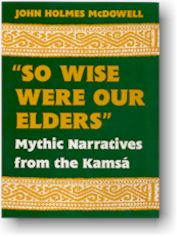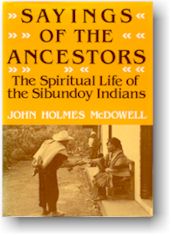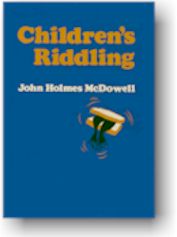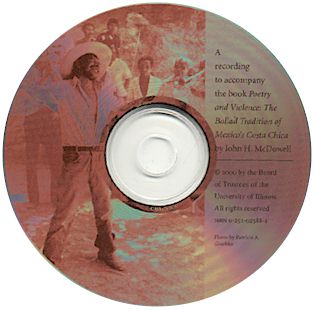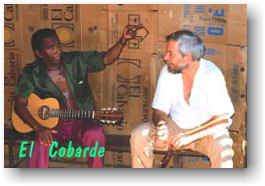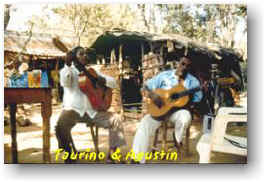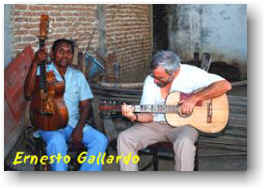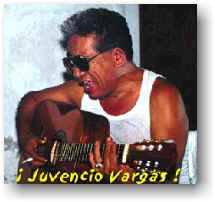![]()
To see about my current work on the narcocorrido, click here
Two books have emerged from this life-long interest. Most recently, the University
of New Mexico Press published in 2015 my collection of corridos, with photos by
Patricia Glushko, musical transcriptions, text in the original Spanish and in my
English translations, and ample commentary on such matters as the historical events
referenced in the songs, the performance techniques, and the aesthetics of music and verse.
¡Corrido! The Living Ballad of Mexico’s Western Coast
https://www.unmpress.com/9780826337436/corrido/
Publisher's blurb:
The present compilation of ballads from the Mexican states of Guerrero and
Oaxaca documents one of the world's great traditions of heroic song, a
tradition that has thrived continuously for the last hundred years. The
107 corridos presented here, gathered during ethnographic research over a
period of twenty-five years in settlements on Mexico's Costa Chica and Costa
Grande, offer a window into the ethos of heroism among the cultures of Mexico's
southwestern coast, a region that has been plagued by recurrent cycles of violence.
John Holmes McDowell presents a richly annotated field collection of corridos,
accompanied by musical scores and transcriptions and translations of lyrics.
In addition to his interpretation of the corridos' depiction of violence and
masculinity, McDowell situates the songs in historical and performance contexts,
illuminating the Afro-mestizo influence in this distinctive population.
Earlier, in 2000, I published with the University of Illinois Press Poetry and
Violence: The Ballad Tradition of Mexico's Costa Chica (released in paperback in 2008).
Poetry and Violence: The Ballad Tradition of Mexico's Costa Chica Cover image: The Highland Troubadour Photographed by: Patricia A. Glushko Supported by the L.J. and Mary C. Skaggs Folklore Fund and by Indiana
University's Vice President for Academic Affairs and Bloomington
Chancellor, the Dean of Faculties, and the College of Arts and
Sciences Released as paperback in 2008!
Buy the book now at
Does art that depicts violence generate more violence?
Taking up a question that touches on contemporary developments such as gangsta rap and
schoolyard shootings, John H. McDowell provides an in-depth study of a
body of poetry that takes violence as its subject: the Mexican ballad
form known as the corrido.
McDowell concentrates on the corrido tradition in Costa Chica, where the ethnic mix includes a
strong African-Mexican, or Afro-mestizo, component. Through
interviews with corrido composers and performers, both male and female,
and a generous sampling of ballad texts, McDowell reveals a living
vernacular tradition that amounts to a chronicle of local and regional
rivalries. In the Costa Chica, the ballads center around land
redistribution in the aftermath of the revolution, the process of capital
formation in the area, and the consolidation of federal authority in this
isolated region.
Focusing on the tragic corrido with its stories of heroic mortal encounter, McDowell
examines the intersection of poetry and violence from three
perspectives. He explores the contention that poetry celebrates violence,
perhaps thereby perpetuating it, by glorifying for receptive audiences
the deeds of past heroes. He discerns a regulatory voice within the
corrido that places violent behavior within the confines of a moral
universe, distinguishing legitimate from illegitimate forms of
violence. Finally, he contends that poetry can be a healing force that
helps sustain the community in the wake of violent events.
A detailed case study with broad social and cultural implications, Poetry and Violence on
Mexico's Costa Chica is a compelling commentary on violence as human
experience and as communicative action.
John H. McDowell, a professor of folklore, director of the Folklore Institute, and
Chair
of the Department of Folklore and Ethnomusicology at Indiana University,
is the author of "So Wise Were Our Elders": Mythic Narratives of
the Kamsa, Sayings of the Ancestors: The Spiritual Life of the Sibundoy
Indians, and Children's Riddling, for which he won the Chicago Folklore
Prize. A volume in the series Music in American Life and in the series Folklore
and Society, edited by Roger Abrahams, Bruce Jackson, and Marta Weigle.
Book Genre: Music / Folklore / Latin American Studies
"John McDowell's book Poetry and Violence is a
brillant in-depth analysis of the relationship between violence and the
corrido. McDowell's splendid insights into an Afromestizo Mexican community
and its cultural production are invaluable to those interested in the corrido tradition. The
interviews undertaken in the Costa Chica, the corridos collected,
and the photographs included in the book are particularly outstanding."
-- Maria Herrera-Sobek, Author, The Mexican Corrido: A Feminist Analysis
"John McDowell's fascinating and nuanced account of tragic corridos and their
place in the lives of people from Mexico's southern Pacific coast captures
the ambivalence at the heart of this musical genre. Extending his
analysis to the border and beyond, McDowell argues perceptively and
engagingly about the beauty and the anguish violence bears in a variety of
social settings."
--Laura A. Lewis, James Madison University
Come sample some of the 11 original Corridos on the accompanying CD:
2.
Tomás Marín
3. Chicharrón
5.
Sidonio
6.
Pedro el Chicharrón
7.
Ernesto Quiñones
8.
Apolonio
9.
Moisés Colón
10.
Palemón Mariano
11.
Matías Rojas;
Honoring my mentor, Américo Paredes, I published in 2014 a translation of
his article, "El Cowboy Norteamericano en el Folklore y en la Literatura"
("The North American Cowboy in Folklore and Literature"), originally published
in Spanish in Argentina; it appears in the Folklore Forum: Translations:
folklore forum.net
FIND other books by JHMcD HERE
Last Modified
Jan 18, 2022
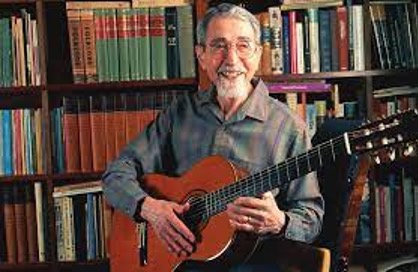 For more than a quarter of a century, I have been on the trail of the
corrido, Mexico's popular ballad form, an interest that I acquired
from one of my mentors at the University of Texas, Professor Américo
Paredes. It was Dr. Paredes who suggested that I travel to the Costa
Chica in search of the living ballad, and that encounter during the summer of
1972 left a permanent mark on me. I have returned to this coastal region of
Mexico several times, most recently for a half-year sojourn in 1996, and little
by little expanded my understanding of the social role played by this artistic
form. My wife Patricia Gluskho and I produced a documentary video on the
corrido of Mexico's Costa Chica, called "Que Me Troven Un Corrido" (Write Me
A Corrido), as well as on the brass bands of Guerrero and on the Easter
passion play in El Treinta, Guerrero. I have taught courses at IU on both
Chicano folklore and the folklore of Mexico. The remarkable traditions of
our neighbors to the south, and increasingly at home, remain a source of
inspiration and fascination.
For more than a quarter of a century, I have been on the trail of the
corrido, Mexico's popular ballad form, an interest that I acquired
from one of my mentors at the University of Texas, Professor Américo
Paredes. It was Dr. Paredes who suggested that I travel to the Costa
Chica in search of the living ballad, and that encounter during the summer of
1972 left a permanent mark on me. I have returned to this coastal region of
Mexico several times, most recently for a half-year sojourn in 1996, and little
by little expanded my understanding of the social role played by this artistic
form. My wife Patricia Gluskho and I produced a documentary video on the
corrido of Mexico's Costa Chica, called "Que Me Troven Un Corrido" (Write Me
A Corrido), as well as on the brass bands of Guerrero and on the Easter
passion play in El Treinta, Guerrero. I have taught courses at IU on both
Chicano folklore and the folklore of Mexico. The remarkable traditions of
our neighbors to the south, and increasingly at home, remain a source of
inspiration and fascination.
![]()
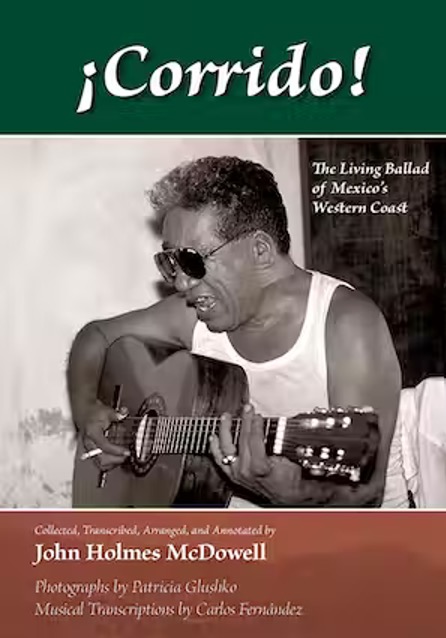
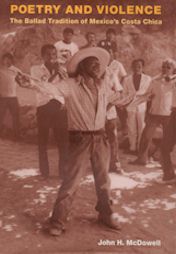
![]()
![]()
